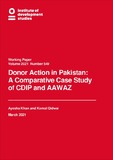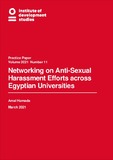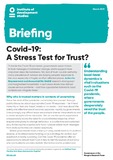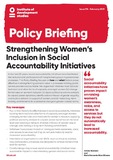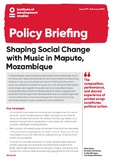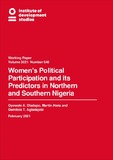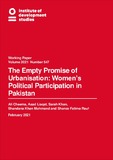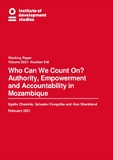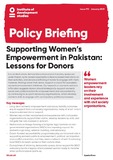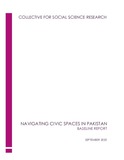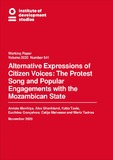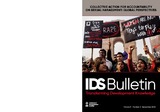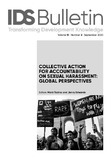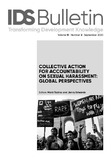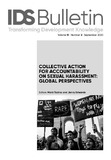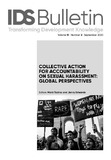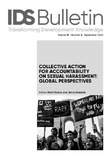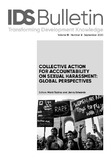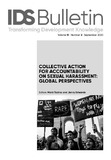Action for Empowerment and Accountability Programme: Recent submissions
Now showing items 41-60 of 126
-
Donor Action in Pakistan: A Comparative Case Study of CDIP and AAWAZ
(Institute of Development Studies, 2021-03)This paper analyses findings from a study of the Consolidating Democracy in Pakistan (CDIP) and AAWAZ Voice and Accountability programmes, both funded by the UK government. The study is a contribution to the A4EA Research ... -
Networking on Anti-Sexual Harassment Efforts across Egyptian Universities
(Institute of Development Studies, 2021-03-09)This paper explores efforts across Egyptian universities to enhance responsiveness and accountability for addressing and mitigating sexual harassment on campus. Though not a new phenomenon, harassment in Egyptian universities ... -
Covid-19: A Stress Test for Trust?
(Institute of Development Studies, 2021-03-04)To tackle the Covid-19 pandemic, governments need citizens to trust messages on behaviour change, and to support more draconian steps like lockdowns. Yet, lack of trust in public authority and a prevalence of rumours ... -
Strengthening Women’s Inclusion in Social Accountability Initiatives
(Institute of Development Studies, 2021-02-18)In the last 20 years, social accountability initiatives have facilitated the inclusion and participation of marginalised groups in governance processes. This Policy Briefing focuses on how and what factors prove effective ... -
Shaping Social Change with Music in Maputo, Mozambique
(Institute of Development Studies, 2021-02-16)In Mozambique, development programmes have traditionally drawn on music as a means to promote social transformation by educating citizens on key social development issues. Shifting the focus from music as a teaching medium ... -
Women’s Political Participation and its Predictors in Northern and Southern Nigeria
(Institute of Development Studies, 2021-02-15)The United Nations Development Programme states that women’s political participation is a necessary ingredient for a peaceful and resilient society, yet large gender gaps obstinately persist in many countries around the ... -
The Empty Promise of Urbanisation: Women’s Political Participation in Pakistan
(Institute of Development Studies, 2021-02-11)Do big cities enable or hinder women’s electoral participation? What are the determinants of women’s participation in big cities and how are they different from those in rural areas? We use the Election Commission of ... -
Who Can We Count On? Authority, Empowerment and Accountability in Mozambique
(Institute of Development Studies, 2021-02-02)In this paper, we explore the use of a governance diaries methodology to investigate poor households’ interactions with authority in fragile, conflict and violence-affected settings in Mozambique. The research questioned ... -
Supporting Women’s Empowerment in Pakistan: Lessons for Donors
(Institute of Development Studies, 2021-01-05)In a context where democratic culture and civil society space are under threat, rights-based organisations face increased restrictions on their activities, and donors are finding it harder to engage with them. However, ... -
Navigating Civic Spaces in Pakistan
(Collective for Social Science Research, 2020-09)This background paper is a review of changing civic spaces in Pakistan during the brief period from July 2018, when national elections brought a new government to power, until the first lockdowns due to the Covid-19 pandemic ... -
Alternative Expressions of Citizen Voices: The Protest Song and Popular Engagements with the Mozambican State
(Institute of Development Studies, 2020-11-02)This study examines Mozambican popular music to investigate three questions: Are notions of empowerment and accountability present in popular music in Mozambique? If so, what can these existing notions of empowerment and ... -
Collective Action for Accountability on Sexual Harassment: Global Perspectives
(Institute of Development Studies, 2020-09-21)The #MeToo movement that spread across the internet in 2017 sparked a focus on sexual harassment as an international issue. However, collective action against sexual harassment did not start with the #MeToo campaign. ... -
Notes on Contributors: Collective Action for Accountability on Sexual Harassment: Global Perspectives
(Institute of Development Studies, 2020-09-21)This is the notes on contributors for IDS Bulletin 51.2, 'Collective Action for Accountability on Sexual Harassment: Global Perspectives' -
Collective Struggles Against Sexual Harassment: What We Have Learnt About Pathways to Accountability and their Outcomes
(Institute of Development Studies, 2020-09-21)The #MeToo movement that spread across the internet in 2017 sparked a focus on sexual harassment as an issue; this article, however, highlights the grass-roots work that had been happening for years before this collective ... -
Fighting Sexual Harassment on Campus: How Local Contexts of Different Universities Affect the Dynamics and Outcome of these Efforts
(Institute of Development Studies, 2020-09-21)In a context where sexual harassment and assault against women is widespread, this article examines the approach taken by three Egyptian universities to the issue. The article argues that the outcome of the universities’ ... -
Women Politicians Navigating the ‘Hostile Environment’ in Pakistan
(Institute of Development Studies, 2020-09-21)Women in Pakistan operate within highly patriarchal contexts that promote their exclusion from public spaces; but those working in politics, the most public of spaces, defy these prevailing gender norms. This article ... -
‘Me Too’ and the ‘List’ – Power Dynamics, Shame, and Accountability in Indian Academia
(Institute of Development Studies, 2020-09-21)In October 2017, Raya Sarkar, a law student of Indian descent, posted a crowdsourced list on Facebook of male academics who allegedly harassed women. India’s academic world splintered and the #MeToo movement became a student ... -
Multilevel Responses to Sexual Violence in Schools in West Africa
(Institute of Development Studies, 2020-09-21)With growing recognition of sexual and gender‑based violence (SGBV) occurring in schools, the governments of Burkina Faso and Benin, partnered with non-governmental organisations (NGOs), have attempted to implement systems ... -
Uniting Against the Tides: Filipino ‘Shefarers’ Organising Against Sexual Harassment
(Institute of Development Studies, 2020-09-21)In the Philippines, seafaring has been associated with men since the sixteenth century. However, in the 1990s, Filipino women started to enter this male-dominated world. But it has not been smooth sailing. Based on interviews ... -
Disruption and Design: Crowdmapping Young Women’s Experience in Cities
(Institute of Development Studies, 2020-09-21)The history of women’s exclusion and invisibility in cities is well charted, yet young women’s experience of sexual harassment and assault has been difficult to quantify. This article discusses the Free to Be project ...

